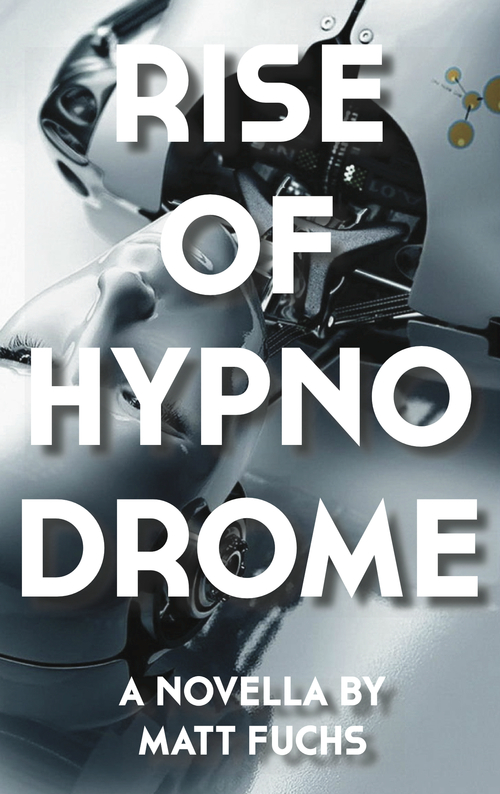
When I drafted my new novella, Rise of Hypnodrome, which takes place in 2039, I couldn’t decide whether the main character, Grady Tenderbath, should order a male or female robot from Amazon.
Mired in a slump at work, Grady is impressed by online reviews about personal robots. They’re praised for their ability to help humans grow as professionals and realize their potential. His robot can be programmed as a man or woman, depending on which gender he thinks he’ll work better with.
Grady’s feelings of self-worth are riding on this robot. The job at his publishing house is the central focus of his life, yet he can’t seem to unlock his creative potential. He is plagued by the sense that he’s underachieving.
I wanted to make things right for my fictional main character. But I have to admit, I wasn’t only thinking about Grady’s creative potential. I was thinking about myself as a male writer. Did I have it in me to create a compelling character out of a female robot?
It’s hard enough to succeed at writing a human of the opposite gender. I know all about this. Before Hypnodrome, I wrote a novel from a woman’s perspective. According to my writer’s workshop, I missed the mark. When my female character had casual sex and said “dude,” she was too bold and assertive – “not believable.” When she cried, she was too meek – “not likeable.” Ultimately her character wasn’t “rounded enough.”
I defended my writer ego by imagining my readers were biased. They simply refused to believe a guy could sufficiently understand women to write from the female perspective. Unfortunately for my writer ego, other male authors have succeeded where I failed, and the folks in my writer’s workshops were more than happy to point them out.
Concluding that writing female characters wasn’t a strength of mine, I decided that Grady would ask for his robot to be programmed as a male. This robot, named Andy, was going to be a very helpful colleague and nurturer of Grady’s talent.
At least, that’s what I planned to have happen in my story outline. The funny thing is, when I actually wrote the scenes, I immediately sabotaged their relationship. Andy lasts only about a week in the Tenderbath household. He’s too aggressive. He thinks in terms of short-term rewards at the expense of strategic, long-term benefits. He’s a male robot in a China shop.
What happened? Looking back, I think Grady’s frustration with Andy had as much to do with me trying to fulfill my own creative potential, as it did with Grady fulfilling his. I knew it was relatively easy for me to make the robot believable and entertaining if the character was male instead of female.
Too easy. I sabotaged Andy because, deep-down, I wanted to push myself.
Luckily there was a quick fix, one that didn’t require Grady to mail back his robot in exchange for another, and didn’t require me to go back and rewrite the whole story.
Andy would have a sex change.
Andy the robot becomes Ashley the robot – no surgery is required, you just press a few buttons. Ashley is more intuitive and strategic than her male predecessor. She could be considered Grady’s “office wife,” a term that carries a connotation of subordinance. But Ashley knows she’s not subordinate as a female, and she doesn’t believe she’s inferior as a robot, either.
She supports Grady and is vulnerable with him, but she’s also incredibly ambitious. Ashley is no one’s office wife.
When I returned to the same workshop, my readers thought I struck a nice balance of traits with my robot, crafting a more believable portrayal of a female than the one from my previous novel. Not only did Ashley help Grady at his publishing company, she helped me as a writer.
But for my next novel, do I dare take another shot at telling a story from the perspective of a human female? Was there something about Ashley being a robot, some extra margin of error that freed me and my readers to connect with her as a character?
Perhaps, in the sequel, Ashley becomes a woman.
ABOUT MATT FUCHS
att Fuchs grew up in Nashville, TN, lived in Baltimore and currently resides in Silver Spring, Maryland, with his wife, Marcy. He majored in the Writing Seminars at Johns Hopkins. Matt has been a freelance food writer; co-founded H&H Creative Ventures, the entertainment production company; and serves on the leadership team at CREATE Arts Center in Silver Spring. “Rise of Hypnodrome” is his first novella.
ABOUT RISE OF HYPNODROME
It’s 2039, and a political faction called the Lifestyle Party has risen to power under the Presidency of Deepak Chopra. The new government bans scientific innovation and introduces a set of policies focused entirely on maximizing personal happiness. So why is Grady Tenderbath so unhappy? Believing that he’s fallen short of his professional potential, he buys a personal robot muse to nurture his talent and ego, while his wife Karen, a genetic scientist, becomes more entrenched in her lab. But just when Grady seems on track to solve his career crisis, he discovers a new problem: he’s swooning for the empathetic yet artificial Ashley. Not only that, he’s distracted by haunting visions of Karen transforming into…something else. “Rise of Hypnodrome” explores how future generations might draw from the realm of epigenetic engineering to eventually control their own biology. Whether human or robot, the characters in this cutting-edge science-fiction novella have one thing in common: an irrepressible desire to evolve.